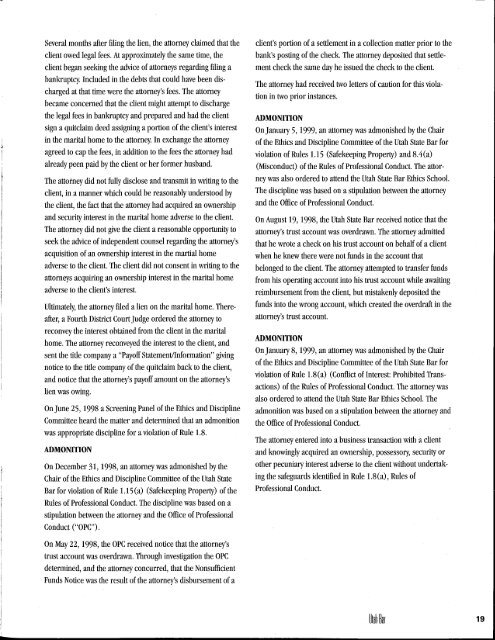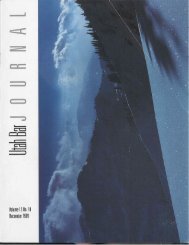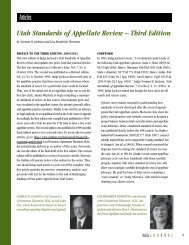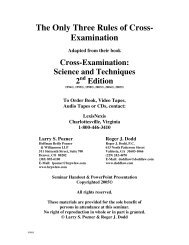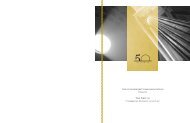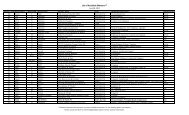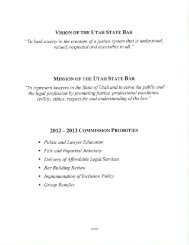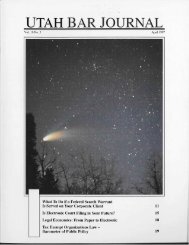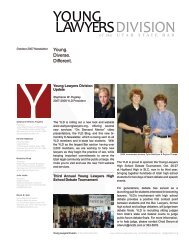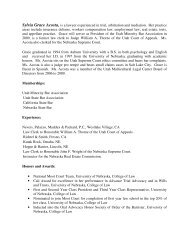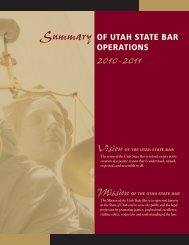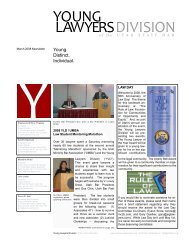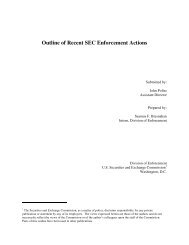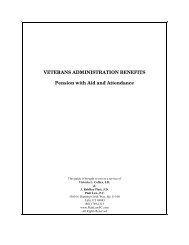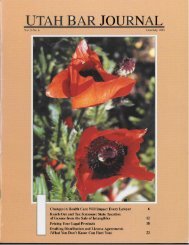March 1999 Volune 12 No3 - Utah State Bar
March 1999 Volune 12 No3 - Utah State Bar
March 1999 Volune 12 No3 - Utah State Bar
Create successful ePaper yourself
Turn your PDF publications into a flip-book with our unique Google optimized e-Paper software.
Several months afer fing the lien, the attorney claimed that the<br />
client owed legal fees. At approximately the same time, the<br />
client began seekig the advice of attorneys regarding fig a<br />
bankrptcy. Included in the debts that could have been dis-<br />
charged at that time were the attorney's fees. The attorney<br />
became concerned that the client might attempt to discharge<br />
the legal fees in bankrptcy and prepared and had the client<br />
sign a quitclaim deed assigning a portion of the client's interest<br />
in the marita home to the attorney. In exchange the attorney<br />
agreed to cap the fees, in addition to the fees the attorney had<br />
already peen paid by the client or her former husband.<br />
The attorney did not fully disclose and transmit in writing to the<br />
client, in a manner which could be reasonably understood by<br />
the client, the fact that the attorney had acquired an ownership<br />
and security interest in the marital home adverse to the client.<br />
The attorney did not give the client a reasonable opportunity to<br />
seek the advice of independent counsel regarding the attorney's<br />
acquisition of an ownership interest in the martial home<br />
adverse to the client. The client did not consent in writing to the<br />
attorneys acquiring an ownership interest in the marita home<br />
adverse to the client's interest.<br />
Ultimately, the attorney fied a lien on the marital home. There-<br />
afer, a Fourth District Court Judge ordered the attorney to<br />
reconvey the interest obtained from the client in the marital<br />
home. The attorney reconveyed the interest to the client, and<br />
sent the title company a "Payoff <strong>State</strong>mentJnformation" giving<br />
notice to the title company of the quitclaim back to the client,<br />
and notice that the attorney's payoff amount on the attorney's<br />
lien was owig.<br />
On June 25, 1998 a Screening Panel of the Ethics and Discipline<br />
Committee heard the matter and determined that an admonition<br />
was appropriate discipline for a violation of Rule 1.8.<br />
ADMONITION<br />
On December 31, 1998, an attorney was admonished by the<br />
Chair of the Ethics and Disciplie Committee of the <strong>Utah</strong> <strong>State</strong><br />
<strong>Bar</strong>for violation of Rule 1.5(a) (Safekeeping Property) of the<br />
Rules of Professional Conduct. The disciplie was based on a<br />
stipulation between the attorney and the Offce of Professional<br />
Conduct ("OPC").<br />
On May 22, 1998, the OPC received notice that the attorney's<br />
trust account was overdrawn. Through investigation the OPC<br />
determined, and the attorney concurred, that the Nonsuffcient<br />
Fuds Notice was the result of the attorney's disbursement of a<br />
client's portion of a settlement in a collection matter prior to the<br />
bank's posting of the check. The attorney deposited that settle-<br />
ment check the same day he issued the check to the client.<br />
The attorney had received two letters of caution for this viola-<br />
tion in two prior instances.<br />
ADMONITION<br />
On January 5, <strong>1999</strong>, an attorney was admonished by the Chair<br />
of the Ethics and Discipline Commttee of the <strong>Utah</strong> <strong>State</strong> <strong>Bar</strong> for<br />
violation of Rules 1.5 (Safekeeping Property) and 8.4(a)<br />
(Misconduct) of the Rules of Professional Conduct. The attor-<br />
ney was also ordered to attend the <strong>Utah</strong> <strong>State</strong> <strong>Bar</strong> Ethics SchooL.<br />
The discipline was based on a stipulation between the attorney<br />
and the Offce of Professional Conduct.<br />
On August 19, 1998, the <strong>Utah</strong> <strong>State</strong> <strong>Bar</strong> received notice that the<br />
attorney's trust account was overdrawn. The attorney admitted<br />
that he wrote a check on his trust account on behal of a client<br />
when he knew there were not funds in the account that<br />
belonged to the client. The attorney attempted to transfer funds<br />
from his operating account into his trust account whie awaiting<br />
reimbursement from the client, but mistakenly deposited the<br />
funds into the wrong account, which created the overdraf in the<br />
attorney's trust account.<br />
ADMONITION<br />
On January 8, <strong>1999</strong>, an attorney was admonished by the Chair<br />
of the Ethics and Discipline Committee of the <strong>Utah</strong> <strong>State</strong> <strong>Bar</strong> for<br />
violation of Rule 1.8(a) (Confct ofInterest: Prohibited Trans-<br />
actions) ofthe Rules of Professional Conduct. The attorney was<br />
also ordered to attend the Uta <strong>State</strong> <strong>Bar</strong> Ethics SchooL. The<br />
admonition was based on a stipulation between the attorney and<br />
the Offce of Professional Conduct.<br />
The attorney entered into a business transaction with a client<br />
and knowingly acquired an ownership, possessory, security or<br />
other pecuniary interest adverse to the client without undertak-<br />
ing the safeguards identifed in Rule 1.8 (a) , Rules of<br />
Professional Conduct.<br />
~ta~ ~ar<br />
19


